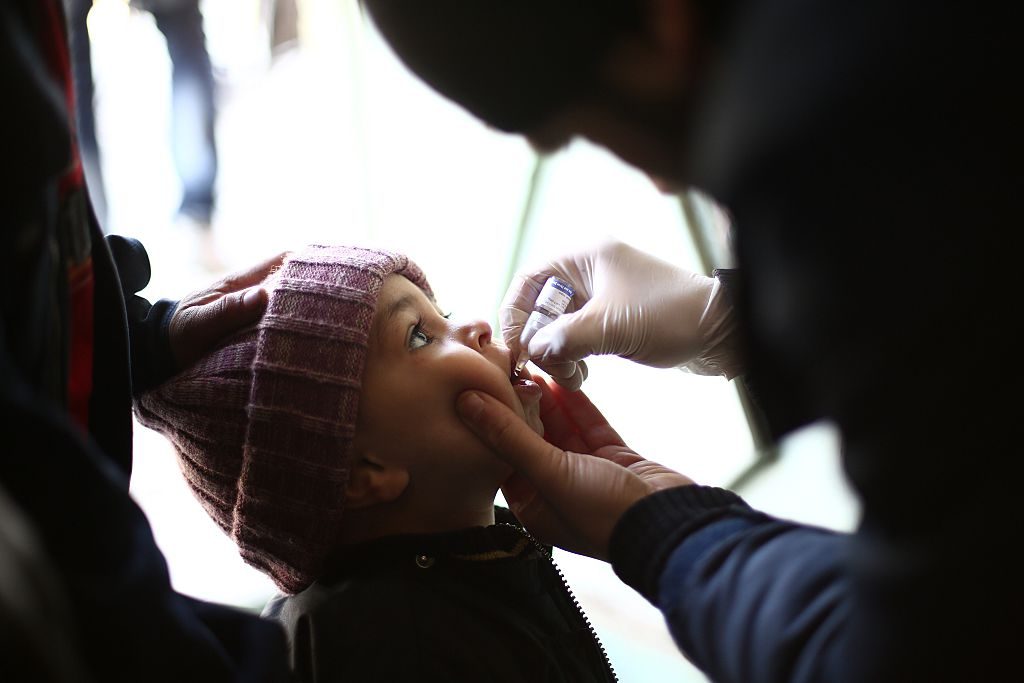By Jacob L. Shapiro
On June 8, the World Health Organization announced a polio outbreak in Syria. According to the WHO, the virus is confirmed to have caused two cases of paralysis in March, and a specimen collected in al-Mayadin, the Islamic State’s new capital, was confirmed to be polio in April. The WHO then said June 20 that there were at least 17 cases of polio-related paralysis in the country and that the number may climb. According to the Centers for Disease Control and Prevention, only between 0.1 percent and 1 percent of those infected with polio experience paralysis. We don’t know how many people in IS-held parts of eastern Syria have contracted the disease, but we do know that the number of confirmed cases likely only scratches the surface of the number infected. And if certain steps aren’t immediately taken, the extremely contagious disease could spread fast.
At the simplest level, the appearance of polio in Syria (or of a cholera epidemic in Yemen, which the WHO described last week as “the worst cholera outbreak in the world”) is a sign that the political strength of groups like the Islamic State is crumbling. Things have gotten so bad in IS-held territory that the most basic health services are unavailable. But there is also a deeper point to be made here about the nature of political power in the modern world and the Islamic State’s relationship to it.
War on Vaccines
This isn’t Syria’s first polio outbreak since its civil war started in 2011. In October 2013, cases of polio were confirmed in Deir el-Zour and Aleppo. That outbreak was largely contained: There were only 36 confirmed polio cases in 2013 and 2014 in the country. The Syrian government had more control over the infected areas at the time and worked with Turkey and others to put a stop to the disease’s spread. The same strain appeared in a few cases in Iraq around the same time, but the Iraqi government mounted an effective nationwide vaccination drive, and the country hasn’t seen a new case in three years. In March 2017, the WHO issued a statement announcing a new vaccination drive throughout Iraq in which it specifically praised the ministries of health in Iraq and the Kurdistan Regional Government for their effective responses to the virus. Iraq is really a country only in name at this point, but its constituent parts still function on a regional level. The same can’t be said of Syria.
The strain seen in Syria’s 2013 outbreak closely resembled strains circulating in Pakistan and was likely imported. (Pakistan and Syria make up half the countries that still have confirmed cases of polio in 2017; the other two are Afghanistan and the Democratic Republic of the Congo.) According to the WHO, however, the strain behind the latest outbreak came from the vaccine itself. The form of the polio vaccine administered in Syria is a weakened form of the virus, and in areas with significant immunity gaps or poor sanitation, the weakened virus can mutate and spread to those without protection. The CDC says infant vaccination levels in Syria declined from 83 percent in 2010 to as low as 47 percent just two years later, which creates a significant gap of immunity in the population. The polio vaccine can grant immunity, but without a coherent plan for the entire region or state, it can also spread the disease.
 A Syrian child receives a vaccination against polio during a campaign organized by the Syrian Arab Red Crescent in the rebel-held area of eastern Ghouta, on the outskirts of the capital Damascus, on Feb. 22, 2015. ABD DOUMANY/AFP/Getty Images
A Syrian child receives a vaccination against polio during a campaign organized by the Syrian Arab Red Crescent in the rebel-held area of eastern Ghouta, on the outskirts of the capital Damascus, on Feb. 22, 2015. ABD DOUMANY/AFP/Getty Images
In both of Syria’s polio outbreaks, the cases have been concentrated in areas outside of the regime’s control – in rebel- and IS-held territories. This is no coincidence. In March, an article in a medical journal called The Lancet accused all participants in the Syrian civil war of targeting health care professionals but singled out Bashar Assad’s regime for attacking health facilities in rebel- and IS-held areas as a tactic of war. Physicians for Human Rights, a U.S.-based nongovernmental organization, noted that at the height of the battle for Aleppo, there was only one physician left for every 7,000 residents. Before the war, there was one physician for every 800 residents. Whether the Assad regime has deliberately targeted health care professionals or not, the effect is the same: Public health services in areas outside the regime’s control have been decimated, with predictable results.
Selective Modernity
There may be no better symbol of Western scientific progress than vaccines. Most grade-school children in the West learn about an English medical student named Edward Jenner, who, in 1796, noticed that milkmaids who contracted a disease called cowpox never contracted smallpox. Through observation and experimentation, Jenner confirmed his hunch, and immunology was born.
The Enlightenment was about many things, but one of the most fundamental was conquering nature. Science became a means by which humans could bend nature to serve human necessity and even desire. People no longer were constrained by how much food could be grown on a given plot of land, or by the ravages of deadly diseases, or even by the religion of their parents. It’s important to remember just how profoundly heretical these ideas were perceived by some at the time. They posited that divine caprice was just a euphemism for ignorance, and that knowledge could set the world free.
Islamists – and really devout Muslims, for that matter – have accepted this basic premise more than is appreciated. They don’t reject modernity outright; they are just selective about which parts they integrate, the same as all religions. Consider that according to The Lancet article, IS actually tried to recruit doctors and managed to set up “a functioning health system with modern facilities and equipment.” Jihadists don’t want their kids to contract polio either. Some Pakistanis in the tribal belt along the Afghan border, where Pakistan’s polio outbreaks have occurred and where society is generally more religious, have had their doubts about vaccines and Western science, but their suspicions stem from the belief that vaccination was used in a CIA plot to kill Osama bin Laden – that an enemy was contriving to use the health of their children for political ends. Islamism is a modern phenomenon with modern concerns, even if it dresses itself in the garb of a glorious and imagined past.
What made the Islamic State’s caliphate unique was that it hoped to combine jihad and fundamentalist Shariah in a polity with modern governing institutions. It failed. If conditions in IS-held territory are so bad that the group can’t contain the spread of polio, obedience from the local population, even at gunpoint, won’t last long.
But a much deeper point needs to be made. Islamism is not at war with modernity so much as it wants to bend modernity to its own political purposes. Not even a group as fanatical as IS wants to stick its head in the sand and leave things to fate. The Islamic State wants power, and in the modern world, part of the power of the state is in regulating a reliable public health system. Parts of Syria and Yemen now exist where no one has that power any longer. In the long term, this is a positive development if the goal is the eradication of the Islamic State. But in the short term, it means that many civilians will suffer. Disease and war are and always have been inextricably linked. Modern science figured out how to eradicate polio. But there is no cure for war.








